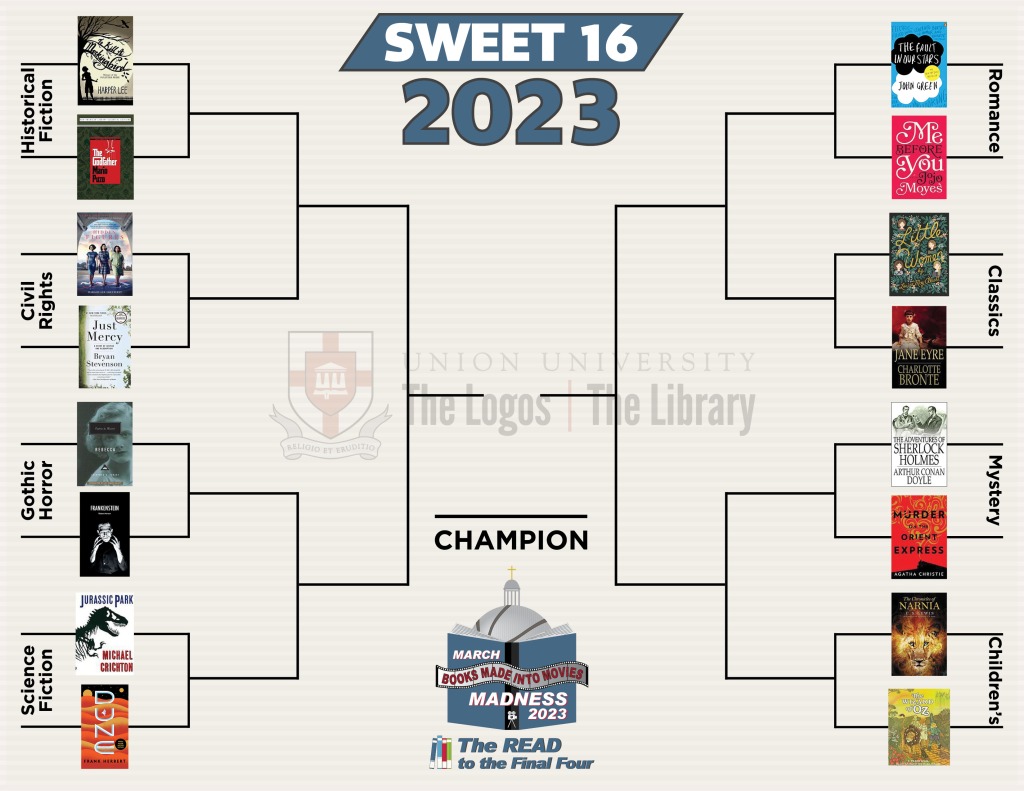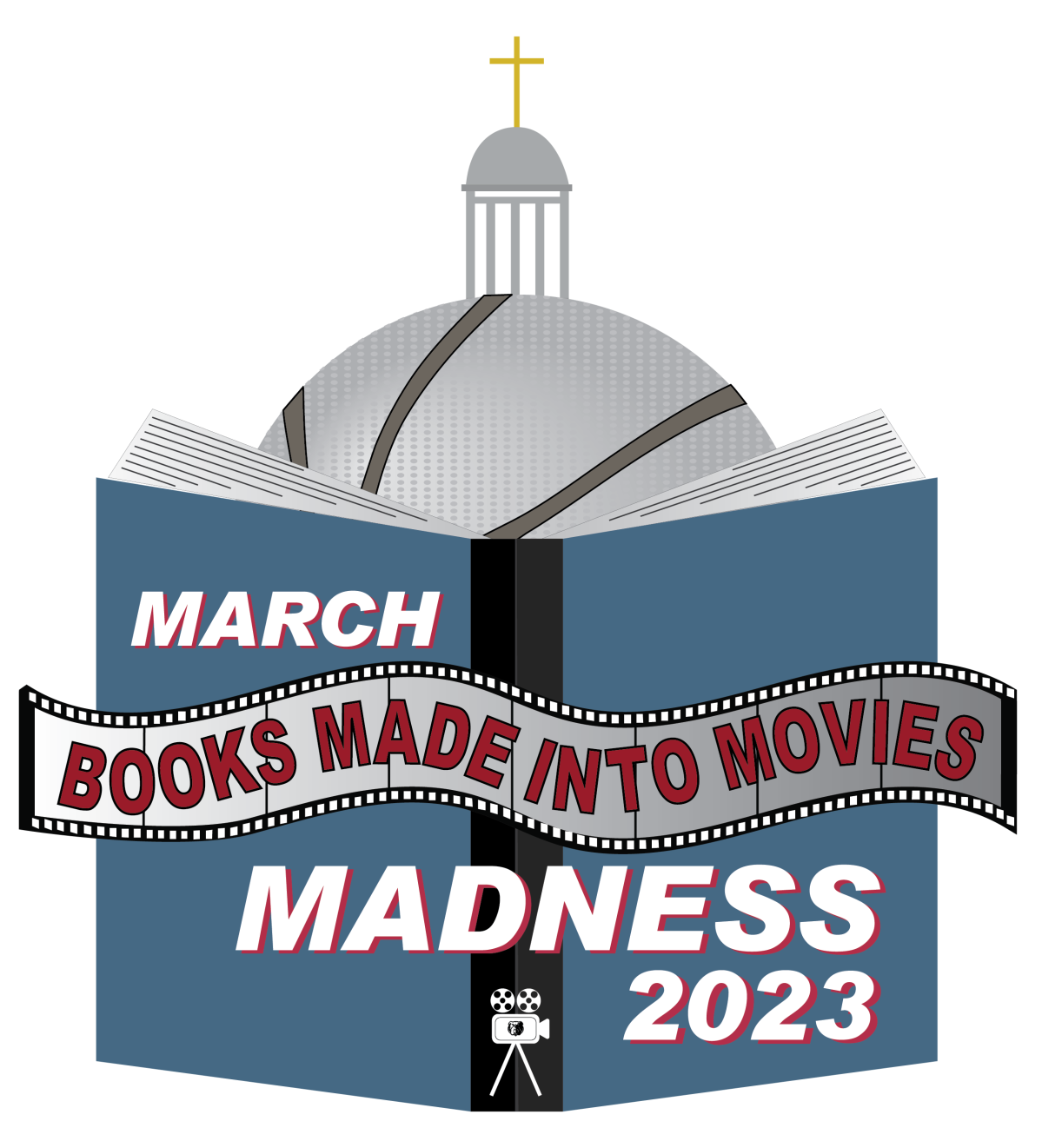
Union University’s Library at the Logos is back with our second presentation of March Book Madness! On Fridays in February, you will be introduced to the books competing in March Book Madness in 2023. One difference this year is that each book has also been made into a movie. We hope that this will help you with the selection process. Each week will feature our titles from two different genres. By the end, you will have been introduced to 8 genres and 16 books. During the month of March, stay tuned to our social media channels to vote on your favorites. Our 2022 Champion was The Very Hungry Caterpillar. Will a familiar favorite win again or will a new contender reach the top of the shelf? You, our readers, will determine the winner. We hope that you journey with us as we make our way through the Final Four and crown our second March Book (& Movie) Madness Champion!
Rachel: Welcome! Thank you for joining us for March Book (& Movie) Madness: 2023 edition. I’m Rachel Bloomingburg, and I’ll be one of your commentators for this week, alongside Darius Mullin. Our goal is to introduce you to the first two of eight genres that will be featured this year. Darius, could you tell us about the two genres to be featured this week?
Darius: Our first two categories are Historical Fiction and Civil Rights! The Historical Fiction genre is typically set in a real time and place, even if the specific characters and events of the story aren’t strictly historical. Our Civil Rights category is a more specific subset of historical fiction that includes stories centered around American citizens’ efforts to attain social and political equality.
Rachel: Both categories are great to help us better understand our past and appreciate strides that have been made for present and future generations. What is our first participant in the Historical Fiction genre?
Darius: Our first Historical Fiction candidate is To Kill a Mockingbird by Harper Lee, alongside the 1962 movie of the same name directed by Robert Mulligan. Set during the Great Depression, To Kill a Mockingbird follows Scout Finch and her family’s experiences in smalltown Alabama. The plot culminates with Scout’s father, lawyer Atticus Finch, defending a black man against a false rape accusation.
Rachel: Yes. I remember this story. What’s our second choice in this genre?
Darius: Next up is The Godfather by Mario Puzo and its movie adaptation directed by Francis Ford Coppola. The plot tells the tale of the fictional Corleone family, an Italian mafia family based in New York City. Set shortly after World War II, the novel/movie initially follows Don Vito Corleone, the head of the family as he runs the family business. But an emergency thrusts Vito’s son Michael—who is introduced as a family misfit, uninvolved in the Corleone business—into the spotlight as main character and mafia leader. Both the book and movie versions of The Godfather are highly acclaimed, present fascinating characters, and are full of violence and intrigue.
Rachel: I don’t know much about The Godfather, but I usually like stories based around the World War II time period. Which of these two do you think will advance to the elite eight?
Darius: It’s hard to say, since both options are American classics. If I had to guess, I think To Kill a Mockingbird might have a slight edge on the competition, since a lot of people have probably read it in high school. How about you introduce us to our contestants in the next category, Civil Rights?
Rachel: Happy to. Our first choice is Hidden Figures: The American Dream and the Untold Story of the Black Women Mathematicians Who Helped Win the Space Race. The book written by Margot Lee Shetterly, as well as the film adaptation directed by Theodore Melfi and shortened to the title Hidden Figures, focuses on a core group of dedicated female mathematicians (nicknamed “human computers”) that are called into service during a labor shortage of World War II. Their work helped give Americans a victory they desperately needed with regards to the space race. Math and science tend to be a male-dominated field, so I appreciate that this shows women making an impact in the field.
Darius: That’s awesome! I’ve seen that movie; it’s a great story! Could you share the second option in this category?
Rachel: Yes. Our second selection is likely more well-known when thinking of the Civil Rights genre. Just Mercy: A Story of Justice and Redemption by Bryan Stevenson, and the 2020 film adaptation starring Michael B. Jordan help to show the disparity and often unfair treatment of those with limited resources, which could lead to individuals being wrongly condemned. The book covers several cases that Bryan worked on, as well as learning what led him to get into the field. The movie focuses on the case of Walter McMillian, a black man that was convicted and sentenced to death for the murder of a young, white woman that he didn’t commit. I really appreciated reading the book because it reminded me that while Walter’s case was the most well-known, Bryan’s work made an impact in multiple cases. Knowing that it’s an autobiography helps to give it an even greater personal nature.
Darius: I remember being very impacted when I read that book. Sounds like two really good duos in this part of the bracket! Any ideas as to which will come out on top?
Rachel: It will be tough because both are powerful and important stories, but I think Just Mercy will come out as the winner.
Darius: Well, folks, that’s all for today! Which of the first four entrants has the best chance of making it to the Final Four this year? Keep an eye on the library Instagram for voting next month, and stay tuned for the introduction of the other twelve contestants in the weeks to come!


